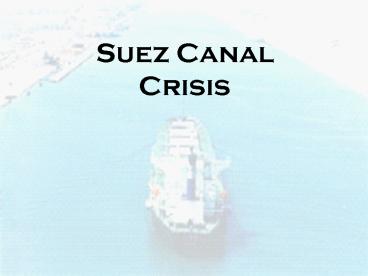Suez Canal Crisis - PowerPoint PPT Presentation
1 / 11
Title:
Suez Canal Crisis
Description:
November 6, 1956 Royal Marines stormed the beaches at El Gamil ... The Suez Crisis (4 of 9) - http://youtube.com/watch?v=7xxcIjYQVIc&feature=related ... – PowerPoint PPT presentation
Number of Views:936
Avg rating:3.0/5.0
Title: Suez Canal Crisis
1
Suez Canal Crisis
2
History of the Canal
- Canal was open in 1869
- Financed by France and Egyptian government
- Operating company was the Universal Company of
the Suez Maritime Canal (Suez Canal Company) - Company was Egyptian-chartered
- In 1875, the British government bought out
Egyptian shares - Gained partial control of canals operations
- In 1882, the UK took de facto control of the
canal - Anglo-Egyptian agreement
- Great Britain protector of Egyptian territorial
interests - Canal very important for strategy during WWI and
WWII - During WWI, canal was closed to non-Allied
shipping - During WWII, it was defended during the North
African Campaign
3
Tension with Egypt and Europe Begins
- In 1956, Egypt (under President Gamal Abdel
Nassar) called for the nationalization of the
Suez Canal Company - Nationalization called for to raise revenues for
the construction of the Aswan High Dam on the
Nile River - The U.S began to try and reduce the tensions in
July but was unsuccessful - International conferences were organized to
secure agreements on the canal operations but no
agreement was reached
4
Secret Meeting
- Britain and France met with Israeli to deal with
Egypt - States agree that Israeli would invade Sinai
- Therefore Britain and France would have to
intervene - They would Instructing that both the Israeli and
Egyptian forces withdraw their forces from the
canal - From this it would be shown Egypt couldnt manage
canal and canal should be put under Anglo-France
management - Britain made sure not to take counsel with the
U.S - Believed that Nasser's engagement with communist
states would persuade the U.S to accept Britain
and French actions - Big mistake!
5
Israeli Invasion
- October 29, 1956 Israeli invaded the Gaze Strip
and Sinai Peninsula - France and Britain offered to intervene to stop
Israeli - Nasser declined their offer
- October 29, 1956 the Kafr Qasim massacre
occurred - 48 Arab-Israeli citizens were killed by Israeli
forces - October 31, 1956 Operation Musketeer took place
- Bombing campaign
- Nasser in response, sank all 40 ships that were
in the canal at that time and closed it to
further shipping
6
Reaction from France and Britain
- November 6, 1956 Royal Marines stormed the
beaches at El Gamil - Large amount of damage occurred to Egyptian
batteries and gun emplacements - Port Said also had a large amount of destruction
- 500 paratroopers from France secured the al-Raswa
bridges - 2 French soldiers were killed
- Many close-air missions that ruined several
SU-100s - 2 large oil storage tanks in Port Said were hit
and went up in flame - Egyptian resistance varied
- 522 French Paras were also dropped off at Port
Fuad - 10 French Soldiers were killed and and 30 injured
- British commandoes met strong resistance
- Several helicopters were hit
- British carrier-borne crafts caused several
deaths from friendly fire - Egyptian snipers caused more causalities
7
Cease-Fire Called
- Eisenhower administration called for a cease-fire
on Britain and France - US sponsored resolutions for the UN security
council for a cease-fire be called in the
invasion - Britain and France vetoed this
- US appealed to General Assembly and proposed a
resolution for a cease-fire and withdraw of
forces - Called proposal Uniting for Peace
- Emergency session called and resolution passed
- Britain and France withdrew forces
- Britain and France forces withdrew completely by
December 1956 - Israeli Forces withdrew completely by March 1957
8
UN Involvement
- Lester Pearson suggested to form a United Nations
Emergency Force (UNEF) in the Suez canal area - Pearson said the reason for this is to keep the
borders at peace while a political settlement is
being worked out - UN had a tense debate over this
- Neutral force sent not involving the US, France,
Britain, and the majority of the Soviet Bloc to
stabilize the area - Pearson awarded Nobel Peace Prize in 1957
- Thought to be the father of modern peacekeeping
9
Outcome
- Showed weakness of the NATO alliance
- Signaled weakness of French and United Kingdom
- Both losing their global powers
- Marked transports of global powers to US and
Soviet Union - Suez Canal Crisis came to be seen as Eisenhower's
greatest foreign policy mistake - Last TIME Britain has gone to war without U.S
supporting them - Hastened Decolonization
10
Sources
- Hoskins, H. The Suez Canal as an International
Waterway The American Journal of International
Law. 22.1(1943) p.81-82. 7 March 2007
http//www.jstor.org/view/00029300/di981649/98p025
62/0?currentResult000293002bdi9816492b98p02562
2b02cFF3FsearchUrlhttp3A2F2Fwww.jstor.org2F
search2FBasicResults3Fhp3D2526si3D126Query3
Dsuez2Bcanal2Bcrisis26wc3Don - Evans Suez Canal Crisis. 2000, NOva 8 March 2007
http//novaonline.nvcc.vccs.edu/eli/evans/his135/E
vents/Suez56.htm - Fraser, Wright, Shupe, Hipel. Nationalization
of the Suez canal A hypergame analysis The
Journal of conflict resolution. 24.3
(Sep.,1980) p.477-493. 7 March 2007
http//www.jstor.org/view/00220027/ap010084/01a000
50/0?currentResult002200272bap0100842b01a00050
2b02cEFB303searchUrlhttp3A2F2Fwww.jstor.org
2Fsearch2FBasicResults3Fhp3D2526si3D126Query
3Dsuez2Bcanal2Bcrisis26wc3Don - Neely The Suez crisis. October 2006. Bodleian
Library of the University of oxford. 6 March 2007
http//www.bodley.ox.ac.uk/dept/scwmss/projects/su
ez/suez.html
11
The Suez Crisis The Other Side of Suez -The Suez
Crisis (1 of 9) - http//youtube.com/watch?vQnsBH
L7PDv0 -The Suez Crisis (2 of 9) -
http//youtube.com/watch?vxxh_Rz9U6BEfeaturerel
ated -The Suez Crisis (3 of 9) -
http//youtube.com/watch?vCY8YYlu0Tbcfeaturerel
ated -The Suez Crisis (4 of 9) -
http//youtube.com/watch?v7xxcIjYQVIcfeaturerel
ated -The Suez Crisis (5 of 9) -
http//youtube.com/watch?vrpqrslWMpgUfeaturerel
ated -The Suez Crisis (6 of 9) -
http//youtube.com/watch?vAN7BX3cudZIfeaturerel
ated -The Suez Crisis (7 of 9) -
http//youtube.com/watch?vQKKtWrsrg_Ufeaturerel
ated -The Suez Crisis (8 of 9) -
http//youtube.com/watch?vg5_IRaLKzlAfeaturerel
ated -The Suez Crisis (9 of 9) -
http//youtube.com/watch?vGR5AubfH_t4featurerel
ated































